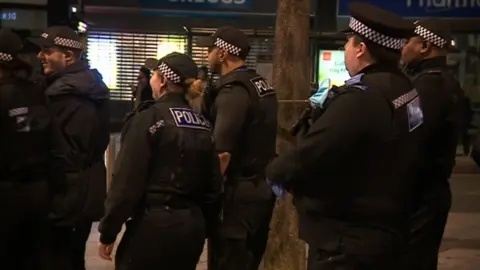Nottingham student tells MPs of 'sadistic' nightclub spiking
 Zara Owen
Zara OwenA student who said she was spiked with a needle has told MPs she believes the "cruel and horrible" act was done for "comedic effect".
Zara Owen said she blacked out soon after arriving at a club in October despite drinking in moderation.
The 20-year-old said she felt the attack was for "sadistic" pleasure.
A parliamentary committee also heard calls for more staff training, easier ways to report attacks and spiking to be made a specific offence.
The House of Commons' Home Affairs Committee opened an inquiry into spiking incidents in December.
'Mind-blowing'
Ms Owen, a French and Spanish student at the University of Nottingham, said she went with her friends to Pryzm nightclub in Nottingham city centre, but cannot remember anything else from the evening.
She said she was found on her own in a takeaway, and in the morning found a pin prick mark on her leg.
While speaking to MPs, she was asked about what she thought was the motivation for the attack.
She said: "For humour, for comedic effect.
"It's a question I have asked myself - what's the gain from this, what drives somebody to inject somebody with a drug?
"It's a sadistic feeling someone must have, to do it for fun when it is so dangerous.
"It's mind-blowing someone could drive themselves to that act."
 Getty Images
Getty ImagesAlexi Skitinis, from South Wales, needed hospital checks after his drink was tampered with while in a club on holiday in Las Vegas.
He felt the motivation was robbery as he had won some money in a casino.
He told the committee: "Where I was, there were no signs or warnings.
"It shocked me a bit as the manager and security openly said it happened quite a lot.
"You'd think there would be more awareness of it."

Julie Spencer, head of student wellbeing at The University of Lincoln, said in November they had started a testing programme for those who reported being spiked.
Of 30 results, only one had been positive for chemical additives, while others had likely been affected by having more alcohol added to their drinks.
She said: "We need to educate people about what a measure of alcohol is, that adding alcohol is a form of spiking.
"And spiking can happen anywhere, many of our cases happened at private parties and were carried out by the wider circle of friends."
The committee also heard from support and campaigning organisations, which called for an easier way to report incidents, more awareness from both bar staff and medical personnel and for tampering with drinks to be made a criminal offence in its own right.
 Getty Images
Getty ImagesHelena Conibear, chief executive of the Alcohol Education Trust, said surveys suggested between 11% and 15% of females and 6% to 7% of males have been spiked.
Their research has found it also occurs in less obvious places than clubs and bars, such as in fast food outlets and cafes, with the largest proportion occurring at private parties.
She said: "It can be any drink, in pretty much any location, and it can happen to any person... we can all be victims."
People can be reluctant to report spiking, she said, adding: "The shame and social embarrassment came up very, very strongly.
"Memory loss, blanks and not really being able to remember what happened and that trauma leading to a time lag before they're prepared to report to anybody, is also a huge barrier."
'Sort this whole thing out'
In December, Nottinghamshire Police said it had received 146 reports of alleged needle spikings, with another 143 cases where people believed their drinks had been tampered with.
Ms Owen said she was pleased with the police response since she reported her case, but has called for stricter security checks on entry into clubs and additional measures when potential victims attend hospital.
"I was one of the first so I think people were a bit shocked," she said.
"I was at hospital for eight hours, and I had a triage and background checks and that was it.
"I would want them to do some sort of check-up - you've got a drug inside your body, you could be suffering from the effects of that.
"They can take our experience of it as a stepping stone to sort this whole thing out."

Follow BBC East Midlands on Facebook, on Twitter, or on Instagram. Send your story ideas to [email protected].
